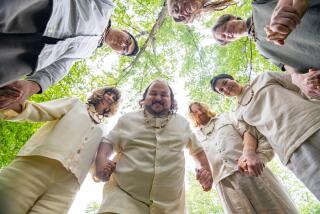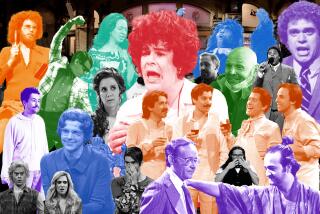Itâs the Sundance of Comedy Fests
ASPEN, COLO. â This quiet mining town is deluged with PIBs (People in Black). The local trustafarian (a hippie trust-funder who bears the Grateful Dead sticker on the back of a turbo Saab) has been displaced by another breed--the zealous PR agent.
Stretch-limo Jeep Wagoneers and Range Rovers line the curb outside the St. Regis Hotel, the headquarters for the annual U.S. Comedy Arts Festival.
The St. Regis has been transformed into a Whoâs Who of Comedy. Billy Crystal, Tina Fey, Rachel Dratch, and Catherine OâHara are all standing in the lobby laughing and looking nonchalant while journalists and agents look on as unobtrusively as vultures. One journalist says, âCan I have one minute, Mr. Crystal? I promise it will be painless.â Crystal replies, âItâs never painless,â and politely bows out.
Like any star-studded media affair, the place is crawling with wannabe industry people sunk deep in leather couches, sipping mochas and fondling their Palm Pilots with the excitement of a new entry in their address book.
Amid the Hollywood scene stands Tom Leykis, conducting a live broadcast of his KLSX-FM show. Suddenly, camera lights and a large microphone dart in front of a man who looks like he might be someone. A group of young men close in on him. They soon move on. Heâs just another PIB, wearing Elvis Costello glasses and sporting a George Clooney shave. Heâs waiting for his wife.
The HBO Comedy Festival has become one of the premier showcases for up-and-coming creators of contemporary comedy and such legends as Jerry Lewis, Steve Martin, Mike Nichols and Elaine May. From Wednesday through Saturday, there will be alternative acts, stand-up, sketch, theater and film from around the world; this yearâs tributes and reunions honor Billy Crystal, Bob Newhart, the cast of âIn Living Colorâ and the film âAmerican Graffiti.â
âThe first time I came here three years ago, I didnât expect it to be so Hollywood and all agents. I was a little shocked. But this time, I know what to expect,â comedian Dratch says while a cable TV producer and cameraman wait their turn. Dratch is half of âDratch and Fey,â the most talked-about sketch duo on todayâs comedy circuit. Dratch is in her second season on âSaturday Night Liveâ and Fey is the first female head writer of âSNLâ in the showâs 25-year history. Schooled at Second City, trained in improv, Dratch and Fey both worked with the late, legendary Del Close, one of the heavyweights in improv.
Dratch and Fey are petite and almost demure when face to face, but by the time they hit the stage at midnight Wednesday at Raw Space, a tangle of concrete, ducts and blue lighting, theyâve morphed into 19th century feminists, Jersey punks, white trash wives, Playboy bunnies, scientists with warped German accents, British tea ladies, spaced-out teenagers and Eastern European pop stars, with the seamlessness of chameleons.
Their show opened in Chicago in 1999 with two weeks of preparation. âIt really helped that we decided to have the opening night two weeks away. It forced us to write it. Itâs really easy to be lazy when youâre an actor,â Dratch says.
Since then, the two have perfected their different comedic talents to complement each other. In the opening act, they share the stage with dual monologues. Dratch presents the life of an obscure historical feminist, Edwina Garth Burnham, using the slightest change of expression to bring the house down, while Feyâs monologue is dark and edgy, at times graphic, as she rants about the trials of being a modern-day woman and about genitalia. The perfect comedic foil. The audience loved it.
âThere are things you just canât say on TV. We can say whatever we want onstage,â Fey says.
Some of their scenes are directly out of improv, and some are scenes Fey wrote for âSNLâ that didnât make the cut. âThe pieces that didnât work were more slice-of-life and less presentational,â Fey says. âOn television itâs hard to make scenic scenes work. We didnât set out to do a female issue show, but a lot of the themes do deal with women. But that was unintentional. The first goal is to create something funny. Hopefully the audience will think so too.â
And they do. Itâs why they both have such good day jobs. Theyâre not here looking for a break like some of the other acts. But they are looking for exposure, like everyone else.
Festival veteran OâHara says, âThe people you want to impress in comedy are all here.â
Dratch says, âWe did this the first time for fun. Then it got attention. Then you want as many people to see it as you can.â
Whether itâs Dave Gorman performing his much-acclaimed âAre You Dave Gorman?,â a multi-country adventure seeking those who share his name, to âFernwood 2-Nightâsâ 22nd anniversary celebration, comedy is a craft that ages well. As Dratch says, âYou just have to do it as much as possible. Take as many classes as you can, put on as many shows as possible.â You never know when itâs your night.


